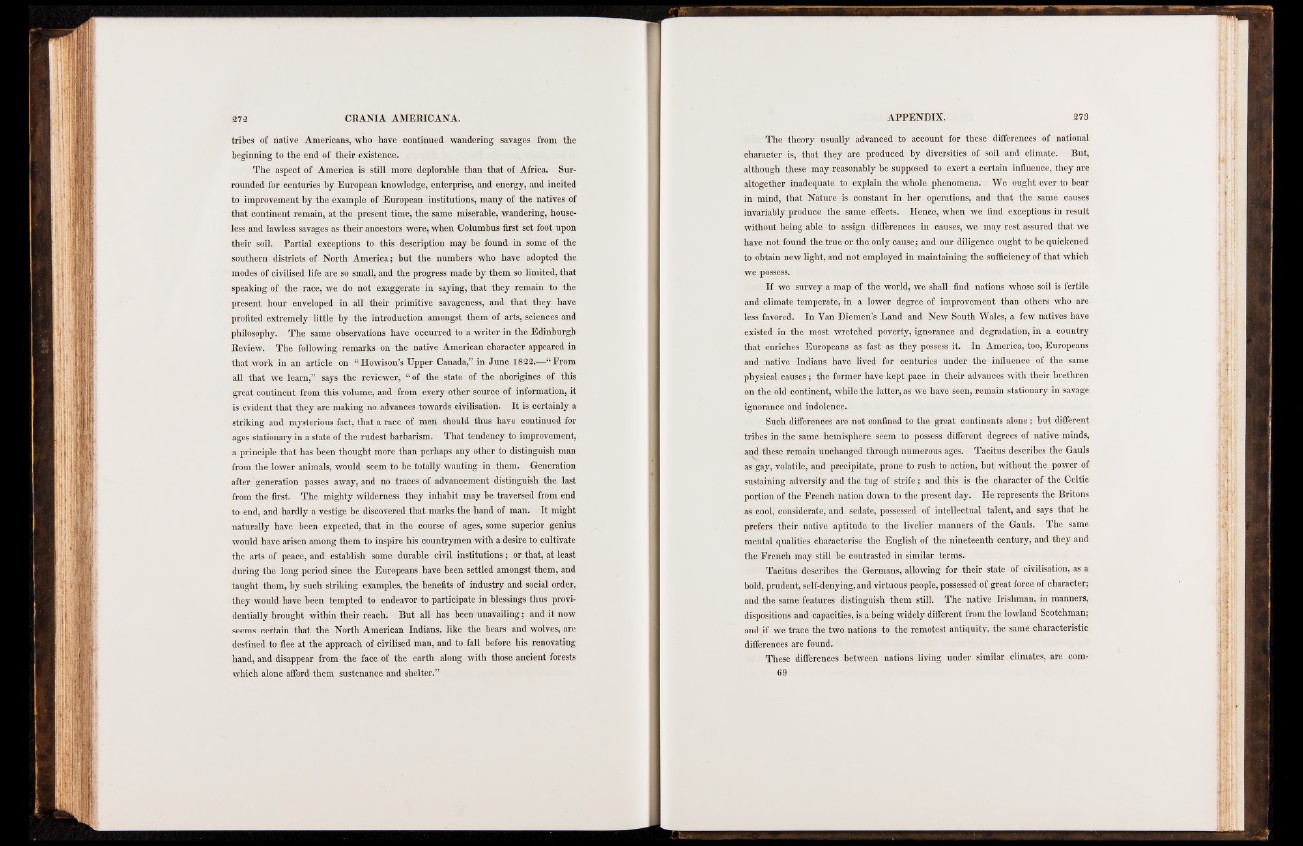
tribes of native Americans, who have continued wandering savages from the
beginning to the end of their existence.
The aspect of America is still more deplorable than that of Africa. Surrounded
for centuries by European knowledge, enterprise, and energy, and incited
to improvement by the example of European institutions, many of the natives of
that continent remain, at the present time, the same miserable, wandering, houseless
and lawless savages as their ancestors were, when Columbus first set foot upon
their soil. Partial exceptions to this description may be found in some of the
southern districts of North America; but the numbers who have adopted the
modes of civilised life are so small, and the progress made by them so limited, that
speaking of the race, we do not exaggerate in saying, that they remain to the
present hour enveloped in all their primitive savageness, and that they have
profited extremely little by the introduction amongst them of arts, sciences and
philosophy. The same observations have occurred to a writer in the Edinburgh
Review. The following remarks on the native American character appeared in
that work in an article on “ Howison’s Upper Canada,” in June 1822.—“ From
all that we learn,” says the reviewer, “ of the state of the aborigines of this
great continent from this volume, and from every other source of information, it
is evident that they are making no advances towards civilisation. It is certainly a
striking and mysterious fact, that a race of men should thus have continued for
ages stationary in a state of the rudest barbarism. That tendency to improvement,
a principle that has been thought more than perhaps any other to distinguish man
from the lower animals, would seem to be totally wanting in them. Generation
after generation passes away, and no traces of advancement distinguish the last
from the first. The mighty wilderness they inhabit may be traversed from end
to end, and hardly a vestige be discovered that marks the hand of man. It might
naturally have been expected, that in the course of ages, some superior genius
would have arisen among them to inspire his countrymen with a desire to cultivate
the arts of peace, and establish some durable civil institutions; or that, at least
during the long period since the Europeans have been settled amongst them, and
taught them, by such striking examples, the benefits of industry and social order,
they would have been tempted to endeavor to participate in blessings thus providentially
brought within their reach. But all has been unavailing; and it now
seems certain that the North American Indians, like the bears and wolves, are
destined to flee at the approach of civilised man, and to fall before his renovating
hand, and disappear from the face of the earth along with those ancient forests
which alone afford them sustenance and shelter.”
The theory usually advanced to account for these differences of national
character is, that they are produced by diversities of soil and climate. But,
although these may reasonably be supposed to exert a certain influence, they are
altogether inadequate to explain the whole phenomena. We ought ever to bear
in mind, that Nature is constant in her operations, and that the same causes
invariably produce the same effects. Hence, when we find exceptions in result
without being able to assign differences in causes, we may rest assured that we
have not found the true or the only cause; and our diligence ought to be quickened
to obtain new light, and not employed in maintaining the sufficiency of that which
we possess.
If we survey a map of the world, we shall find nations whose soil is fertile
and climate temperate, in a lower degree of improvement than others who are
less favored. In Van Diemen’s Land and New South Wales, a few natives have
existed in the most wretched poverty, ignorance and degradation, in a country
that enriches Europeans as fast as they possess it. In America, too, Europeans
and native Indians have lived for centuries under the influence of the same
physical, causes; the former have kept pace in their advances with their brethren
on the old continent, while the latter, as we have seen, remain stationary in savage
ignorance and indolence.
Such differences are not confined to the great continents alone; but different
tribes in the same hemisphere seem to possess different degrees of native minds,
and these remain unchanged through numerous ages. Tacitus describes the Gauls
as gay, volatile, and precipitate, prone to rush to action, but without the power of
sustaining adversity and the tug of strife; and this is the character of the Celtic
portion of the French nation down to the present day. He represents the Britons
as cool, considerate, and sedate, possessed of intellectual talent, and says that he
prefers their native aptitude to the livelier manners of the Gauls. The same
mental qualities characterise the English of the nineteenth century, and they and
the French may still be contrasted in similar terms.
Tacitus describes the Germans, allowing for their state of civilisation, as a
bold, prudent, self-denying, and virtuous people, possessed of great force of character;
and the same features distinguish them still. The native Irishman, in manners,
dispositions and capacities, is a being widely different from the lowland Scotchman;
and if we trace the two nations to the remotest antiquity, the same characteristic
differences are found.
These differences between nations living under similar climates, are com